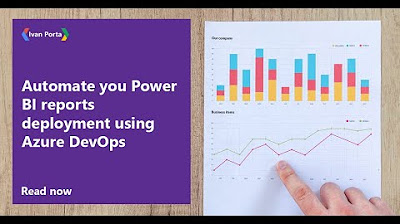What is DevOps? - DevOps explanation by WebGentle | Explained Dev
Summary
TLDRThis tutorial introduces the fundamental concepts of Azure DevOps, a complete guide for both beginners and experienced users. It defines DevOps as a collaborative culture between development and operations teams, emphasizing its significance in the software development lifecycle. The video covers the basics of DevOps, its benefits like faster deployment, quality assurance, and enhanced collaboration, and highlights the importance of learning DevOps for various roles in the software development process. It also touches on the automation tools available to facilitate DevOps practices, ensuring a secure and efficient workflow.
Takeaways
- 😀 The tutorial is a comprehensive guide to Azure DevOps, suitable for both beginners and experienced users.
- 🏗️ DevOps is not a tool or methodology, but a culture and practice that bridges the gap between development and operations teams.
- 🤔 The need for DevOps arises from the challenges in integrating development and operations processes in software development.
- 💡 Benefits of learning DevOps include understanding the complete software development lifecycle and improving collaboration across teams.
- 👨💼 Everyone involved in software development, from developers and testers to product owners and operations teams, should learn DevOps.
- 🚀 DevOps enables fast delivery by automating the process from code commit to deployment, enhancing speed and efficiency.
- 🔍 Quality is maintained through automated testing and deployment processes, ensuring that only high-quality code is pushed to production.
- 🔄 Rollbacks are made easy with DevOps, allowing teams to quickly revert to previous versions if needed.
- 🤝 Collaboration is a key aspect of DevOps, with all teams working together to build a great product.
- 🌟 DevOps brings more agility to development by treating every commit as a potential final delivery, aligning with Agile principles.
- 🛡️ Security is a major concern in DevOps, and tools like Azure DevOps offer robust security features to ensure the safety of the development process.
Q & A
What is the main focus of this tutorial?
-The main focus of this tutorial is to provide a comprehensive understanding of Azure DevOps, covering everything from scratch, whether you are a beginner or an experienced user.
What is the agenda for the first part of the tutorial?
-The agenda for the first part includes understanding what DevOps is in general, its need, who should learn DevOps, and the benefits of learning DevOps.
How does the software development life cycle typically work?
-The software development life cycle typically involves planning, coding, building the code, testing, deploying on the server, performing operations, and monitoring the server.
What is the difference between working in a startup and a big organization in terms of software development?
-In a startup or small team, the same team handles planning, development, and deployment. In contrast, in a big organization, different teams handle planning, development, and operations, each with specific roles.
What is the role of the business team or product owner in the software development process?
-The business team or product owner is responsible for working with the client and focusing on the planning part of the product.
What is the significance of Agile in bridging the gap between teams?
-Agile helps in filling the gap between the business team or product owner and the development team, ensuring they work together towards the success of a product.
What is DevOps and how does it relate to the development and operations teams?
-DevOps is a culture or practice that brings together the development and operations teams to work collaboratively, filling the gap between them and ensuring the quality of the product throughout the software development life cycle.
Why is DevOps considered a culture or practice rather than just a tool or process?
-DevOps is considered a culture or practice because it emphasizes the collaboration and communication between development and operations teams, rather than being a specific tool or process.
What are some of the benefits of learning DevOps?
-Benefits of learning DevOps include fast delivery of code, reduced time for testing and deployment, easy rollback of releases, improved quality of code, enhanced collaboration, increased agility, ease of use, no maintenance cost, reliability, and security.
Who should learn DevOps according to the tutorial?
-Everyone involved in software development, including developers, testers, product owners, scrum masters, operations team members, individual developers, freelancers, management, and clients, should learn DevOps.
Outlines

Dieser Bereich ist nur für Premium-Benutzer verfügbar. Bitte führen Sie ein Upgrade durch, um auf diesen Abschnitt zuzugreifen.
Upgrade durchführenMindmap

Dieser Bereich ist nur für Premium-Benutzer verfügbar. Bitte führen Sie ein Upgrade durch, um auf diesen Abschnitt zuzugreifen.
Upgrade durchführenKeywords

Dieser Bereich ist nur für Premium-Benutzer verfügbar. Bitte führen Sie ein Upgrade durch, um auf diesen Abschnitt zuzugreifen.
Upgrade durchführenHighlights

Dieser Bereich ist nur für Premium-Benutzer verfügbar. Bitte führen Sie ein Upgrade durch, um auf diesen Abschnitt zuzugreifen.
Upgrade durchführenTranscripts

Dieser Bereich ist nur für Premium-Benutzer verfügbar. Bitte führen Sie ein Upgrade durch, um auf diesen Abschnitt zuzugreifen.
Upgrade durchführenWeitere ähnliche Videos ansehen

#1 What is TestRigor | Create Stable Automated Tests In Plain English |Test Automation Tool

How to troubleshoot issues in Computer Networks? // Wireshark Tutorial

DevOps Roadmap for Developers Switching to DevOps

Azure Mini / Sample Project | Development of Azure Project with hands-on experience. Learn in lab.

Automate you Power BI reports deployment using Azure DevOps

How to Configure RIP Version 1 (RIPv1) on Cisco Router in Cisco Packet Tracer | Expert Guide 🌐🔧
5.0 / 5 (0 votes)
